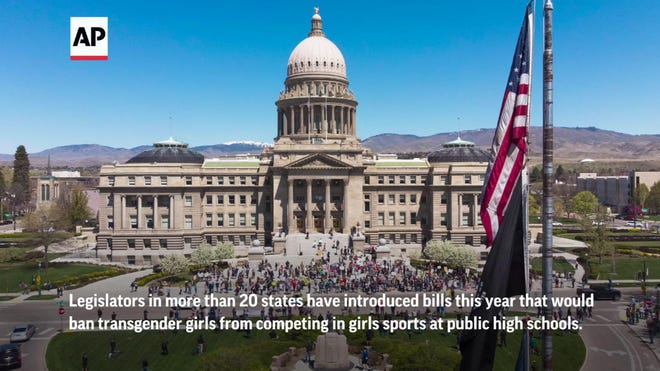A Brevard Public School District internal document listing accommodations for LGBT students, including allowing transgender children to use the bathrooms and play on sports teams consistent with their gender identities, began making the rounds on social media this week, prompting outrage from parents and public officials.
The guidance takes stances on several hot-button issues related to LGBT children that have appeared in court cases and legislation.
Students may dress as the gender with which they identify; should be referred to by their preferred names and pronouns, can access locker rooms and restrooms consistent with their gender identities “or be provided appropriate accommodations” and can participate in school clubs and activities, including interscholastic athletics, as the genders with which they identify, according to the document.
All students have the right to bring same-gender dates to school events, form and participate in LGBT-related organizations and decide when and with whom information about their sexual orientation and gender identities can be shared, according to the guidelines.
The document was shared Monday with school leaders as a reference guide to district practices, BPS spokesperson Russell Bruhn said. Bruhn added that the practices have been in place for some time and are based on legislation and case law.
“Over the years it became apparent that at the school level, a hard document (for) principals and other school leaders on how to address situations to help all of our students be accommodated was needed,” Bruhn said.
More:Brevard School Board passes LGBT non-discrimination policy
The guidance keeps BPS in compliance with state and federal law and does not favor LGBT students over their peers, Bruhn said. He said the school district would not force a child to share a locker room or bathroom with a trans student.
“Our goal is to give every child an excellent education, and that’s every child,” Bruhn said. “So we make accommodations for them. Most of the accommodations are for trans children, but if (their peers) have a concern about somebody coming into a classroom, a bathroom, a locker room, their concerns are taken just as seriously as concerns of somebody who identifies as a gender they weren’t born as.”
But the guidance was ill-received by some conservative parents and public figures, who posted about it on Facebook.
“I share your outrage over new ‘guidance’ from local education bureaucrats that would allow a student to claim a gender other than biologic fact without a parent’s permission, and which would allow boys access to girl’s locker rooms without notification of either the female students nor their parents,” State Rep. Randy Fine said in a Mar. 3 Facebook post. “This is absolutely unacceptable.
“I hate to break it to the local politicians and bureaucrats, but parents are in charge — not them. I assure you that during the legislative session, and as a member of House Education leadership, we will be working to resolve this insanity.”
By Friday, the post had gathered nearly 500 comments, most of them in agreement with Fine.
Fine told FLORIDA TODAY that he intends to support legislation in the Florida House that would limit trans girls’ participation in girls’ sports.
“This also increases my desire to expand school choice so parents are not forced to subject their children to these radical education bureaucrats,” Fine said.
Tina Descovich, a former school board member and founder of conservative group Moms for Liberty, also posted critically of the guidance on Facebook. She connected it to a 2016 school board meeting in which the board voted to add “gender identity” to the district’s nondiscrimination policy. At the time, she said, the public was assured that changing the policy would not result in changes like those listed in the document.
“Parents that spoke (myself included) were told this policy adjustment had nothing to do with restrooms, locker rooms etc. and the change would not impact anything other than helping LGBTQ students feel like they had more protection from being bullied,” Descovich wrote.
Brevard School Board Chair Misty Belford, who voted in favor of the non-discrimination policy in 2016, said the vote had little to do with the practices outlined in the document.
“We had lots of discussion at the time because people were calling it the bathroom policy, and we were like, ‘Look, this has nothing to do with bathrooms,’” Belford said. “But then in 2020 a case came down in (federal court) that said we must allow students to use the bathroom with which they identify.”
Belford was referring to a case in Florida’s 11th district court in which a high schooler who had transitioned from female to male was told to use the female or gender neutral restrooms or face discipline. In August, a judge ruled that school discriminated against the student.
Belford said the BPS guidance would likely be a topic of discussion at Tuesday’s school board meeting to clarify the policy.
Regardless of parents’ concerns, decisions about how trans students can dress, use the bathroom and participate in sports are often not in the hands of the School Board, and the school district is bound to state laws, policies and legal precedent, Belford said.
“When we’re elected, we take an oath to uphold the laws and the Constitution of the State of Florida and the United States of America,” Belford said. “A lot of that is really outside of our ability to make changes. It’s what’s happening in the court system and at the federal level and the state level. … Our community and even our representatives are unaware of that.”
Bailey Gallion is the education reporter for FLORIDA TODAY. Contact Gallion at 321-242-3786 or bgallion@floridatoday.com.

